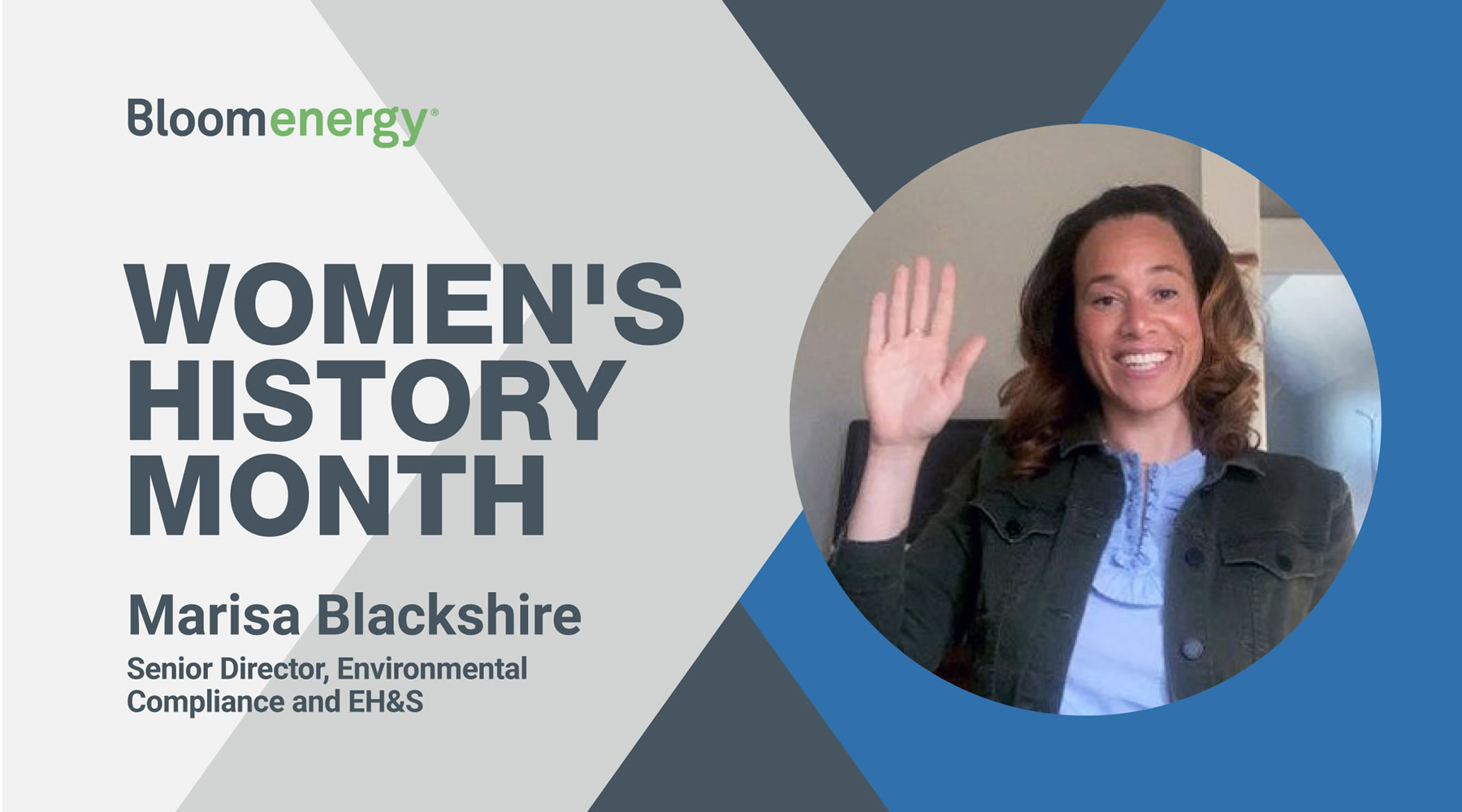Here at Bloom, our very own women shine in leadership roles across our business.
That’s why in honor of International Women’s Day and Women’s History Month we’ll be spotlighting many of the talented women working at Bloom Energy.
In this four-part series, women of Bloom will share their unique stories and perspectives alongside the International Women’s Day theme of #ChooseToChallenge, showing solidarity and commitment to challenging inequality, calling out bias, developing a platform for discussion, and helping to forge an inclusive world. Each year an annual IWD campaign theme is celebrated and continues all year long to unify direction and galvanize activity by providing a meaningful framework to connect and amplify action. Enjoy the second installment in our series below.
Marisa Blackshire – Senior Director, Environmental Compliance and EH&S
Marisa is furthering Bloom’s mission of making clean, reliable, and affordable energy accessible by building the profile and engagement on environmental, health, and safety issues company-wide.
Prior to joining Bloom, Marisa was a Senior General Attorney at BNSF Railway. In that role, Marisa led BNSF’s environmental legal, air, and climate programs system wide. She also worked on various environmental permitting, regulatory compliance, and litigation matters across the BNSF system, which includes 28 states and three Canadian provinces. Before BNSF, Marisa was in private practice at Alston & Bird LLP, where she worked on similar issues for clients, including petroleum companies, mines, energy providers, residential developers, the world’s largest retailer, and local agencies developing large scale infrastructure.
Marisa is active in the American Bar Association’s Section of Environment, Energy and Resources, chairing its 2018 Spring Conference and currently serves on its Council and Equity and Inclusion Task Force. She also serves on the Environmental Law Institute (ELI) Board. Marisa’s community involvement includes supporting multiple causes that provide high quality programming and resources to at-risk youth.
Marisa received her B.A. from the University of California, Santa Barbara and her J.D. from Southwestern Law School in Los Angeles.
Watch the video below to hear Marisa’s perspective on some of the biggest challenges women face today, how those will change in the next 20 years, and ways to create a more inclusive work culture.
Don’t forget to check out last week’s feature on Jessica Mahler, Director, Mechanical Engineering, and follow along with the Bloom Energy social channels as we continue to share featured women in honor of Women’s History Month.
This year’s theme for International Women’s Day is #ChooseToChallenge. How do you choose to challenge and call out gender bias and inequality, celebrate women’s achievements and/or help create an inclusive world?
I #ChooseToChallenge men, particularly white men, to come to the table and be an active part of the conversation and movement for gender equality. All too often, women and people of color find themselves in rooms looking to solve their own problems. Affinity groups and safe spaces are important and must continue to exist. But, no real change will be made until we’re all in the room acknowledging gender bias and inequality and men are taking an active role, intentionally championing change and the breakdown of traditional power structures.
What are some of the biggest challenges that women face today? How will these change in the next 20 years?
I think we are all keenly aware of, have seen the studies that have been done regarding how COVID-19 and its effect on childcare infrastructure have disproportionately impacted women in the workplace. There are no absolutes, but, women are the ones that are largely shouldering the burden of trying to be a parent, a teacher, a babysitter, and an employee in this unprecedented time. While this is a once in a lifetime phenomenon, I think it’s just a microcosm of what was happening before and what will happen after if we don’t have a “come-to Jesus” about expectations in the workplace, in the home, and what’s acceptable if you want to be successful. I also hope it’s an inflection point in terms of change. Nobody can have it all. But, men have been building careers and raising families, and making the sacrifices that go along with that without consequence for years. Women should be afforded the same grace and given the same latitude to foster their talents without judgment and without the pretense that they can, and must do it all perfectly to be successful.
We now have the first female Vice President in American history. How do you think this achievement lends to shattering the glass ceiling?
I don’t want to be a Debbie Downer, but one of something is not indicative of sweeping change in my assessment. I’m thrilled to see somebody that looks like me (in a whole myriad of ways) in the second highest office in the land. I’m not, however, so naive to think that it’s more than what it is. Now that it’s been done, it is no longer an impossibility or a fantasy, which is of course something I celebrated. I had chills when she was up on that stage in her white suit. I believe it’s a step toward other women, including myself, believing they are capable of more than what they previously thought was possible. But, if I do a broad survey of female CEOs at Fortune 500 companies, the numbers are something like 37 of 500, or 7.4%. There are three women of color total. Kamala Harris plus three of 500 CEOs does not translate to a conclusion that anything has been shattered in my assessment.
What advice would you give to the next generation of women entering their careers?
Be bold, be yourself, speak up, don’t ask for permission to do things the way that you need to do them in order to succeed.
How can companies create an inclusive work culture where women’s careers thrive and achievements are celebrated?
I’m hoping that one of the things COVID-19 is teaching everybody is that there is a myriad of ways to be productive and that to the extent women are bearing the brunt of the caretaking responsibilities in our homes. One of the major means to creating an inclusive work culture is finding ways to make appropriate accommodations/adjust expectations in a fashion that we now know won’t impact the work.
In addition, however, I think just acknowledging the fact that women are not succeeding at the same rates as men is key to addressing the problem. Like I alluded to in my first answer, if men in leadership are coming to work every day and being intentional about creating an inclusive work culture, giving women a voice, mentoring strong women, doing whatever they can to help women thrive at the same rates as the talented men in their organizations, that is going to go a long ways in terms of changing the narrative and the outcomes in any work environment. In this day and age, if you can’t find a way to develop and foster female talent in your organization, it’s because you don’t want to.
Any closing thoughts?
There is work to be done all over the place. We, as women, need to demand more, we need to have the courage to apply for roles that we may not be 100 percent qualified for, just like men. We need to have the guts to negotiate our pay and value ourselves in ways that we know men have no problem doing. Leadership needs to be intentional about rewarding those things. They need to catch themselves when they fall into the trap of punishing strong women for the same characteristics that they value in other men. They need to check themselves when they fall into these traps: –
“But what if she gets pregnant?”
“How will her family affect her commitment or availability?”
“What if the older man finds out that she’s making more than him?
“Will the older man be accepting of her as a leader?”
All of those things are still happening, and we need to be open and honest about it, check ourselves and our collective biases in all of our interactions, and be intentional about change if we’re going to continue to move the needle on gender equality.



